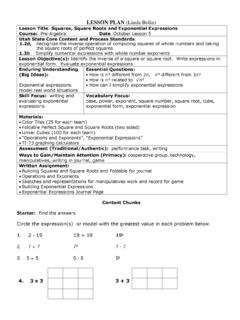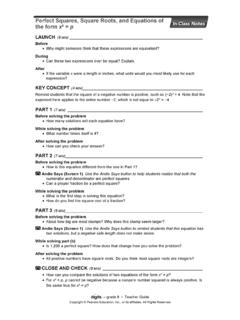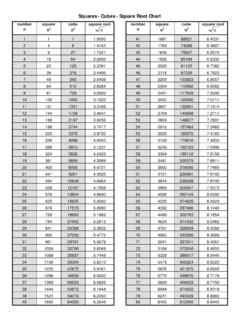Transcription of Class VIII Chapter 6 – Squares and Square Roots Maths ...
1 Class VIII Chapter 6 Squares and Square Roots Maths Page 1 of 46 Website: Email: Mobile: 9999 249717 Head Office: 1/3-H-A-2, Street # 6, East Azad Nagar, Delhi-110051 (One Km from Welcome Metro Station) Exercise Question 1: What will be the unit digit of the Squares of the following numbers? (i) 81 (ii) 272 (iii) 799 (iv) 3853 (v) 1234 (vi) 26387 (vii) 52698 (viii) 99880 (ix) 12796 (x) 55555 Answer: We know that if a number has its unit s place digit as a, then its Square will end with the unit digit of the multiplication a a.
2 (i) 81 Since the given number has its unit s place digit as 1, its Square will end with the unit digit of the multiplication (1 1 = 1) , 1. (ii) 272 Since the given number has its unit s place digit as 2, its Square will end with the unit digit of the multiplication (2 2 = 4) , 4. (iii) 799 Since the given number has its unit s place digit as 9, its Square will end with the unit digit of the multiplication (9 9 = 81) , 1. (iv) 3853 Since the given number has its unit s place digit as 3, its Square will end with the unit digit of the multiplication (3 3 = 9) , 9.
3 (v) 1234 Since the given number has its unit s place digit as 4, its Square will end with the unit digit of the multiplication (4 4 = 16) , 6. (vi) 26387 Since the given number has its unit s place digit as 7, its Square will end with the unit digit of the multiplication (7 7 = 49) , 9. (vii) 52698 Class VIII Chapter 6 Squares and Square Roots Maths Page 2 of 46 Website: Email: Mobile: 9999 249717 Head Office: 1/3-H-A-2, Street # 6, East Azad Nagar, Delhi-110051 (One Km from Welcome Metro Station) Since the given number has its unit s place digit as 8, its Square will end with the unit digit of the multiplication (8 8 = 64) , 4.
4 (viii) 99880 Since the given number has its unit s place digit as 0, its Square will have two zeroes at the end. Therefore, the unit digit of the Square of the given number is 0. (xi) 12796 Since the given number has its unit s place digit as 6, its Square will end with the unit digit of the multiplication (6 6 = 36) , 6. (x) 55555 Since the given number has its unit s place digit as 5, its Square will end with the unit digit of the multiplication (5 5 = 25) , 5. Question 2: The following numbers are obviously not perfect Squares .
5 Give reason. (i) 1057 (ii) 23453 (iii) 7928 (iv) 222222 (v) 64000 (vi) 89722 (vii) 222000 (viii) 505050 Answer: The Square of numbers may end with any one of the digits 0, 1, 5, 6, or 9. Also, a perfect Square has even number of zeroes at the end of it. (i) 1057 has its unit place digit as 7. Therefore, it cannot be a perfect Square . (ii) 23453 has its unit place digit as 3. Therefore, it cannot be a perfect Square . (iii) 7928 has its unit place digit as 8. Therefore, it cannot be a perfect Square . (iv) 222222 has its unit place digit as 2.
6 Therefore, it cannot be a perfect Square . (v) 64000 has three zeros at the end of it. However, since a perfect Square cannot end with odd number of zeroes, it is not a perfect Square . (vi) 89722 has its unit place digit as 2. Therefore, it cannot be a perfect Square . (vii) 222000 has three zeroes at the end of it. However, since a perfect Square cannot end with odd number of zeroes, it is not a perfect Square . Class VIII Chapter 6 Squares and Square Roots Maths Page 3 of 46 Website: Email: Mobile: 9999 249717 Head Office: 1/3-H-A-2, Street # 6, East Azad Nagar, Delhi-110051 (One Km from Welcome Metro Station) (viii) 505050 has one zero at the end of it.
7 However, since a perfect Square cannot end with odd number of zeroes, it is not a perfect Square . Question 3: Find the smallest number by which each of the following numbers must be multiplied to obtain a perfect cube. (i) 243 (ii) 256 (iii) 72 (iv) 675 (v) 100 Answer: (i) 243 = 3 3 3 3 3 Here, two 3s are left which are not in a triplet. To make 243 a cube, one more 3 is required. In that case, 243 3 = 3 3 3 3 3 3 = 729 is a perfect cube. Hence, the smallest natural number by which 243 should be multiplied to make it a perfect cube is 3.
8 (ii) 256 = 2 2 2 2 2 2 2 2 Here, two 2s are left which are not in a triplet. To make 256 a cube, one more 2 is required. Then, we obtain 256 2 = 2 2 2 2 2 2 2 2 2 = 512 is a perfect cube. Hence, the smallest natural number by which 256 should be multiplied to make it a perfect cube is 2. (iii) 72 = 2 2 2 3 3 Here, two 3s are left which are not in a triplet. To make 72 a cube, one more 3 is required. Then, we obtain 72 3 = 2 2 2 3 3 3 = 216 is a perfect cube. Class VIII Chapter 6 Squares and Square Roots Maths Page 4 of 46 Website: Email: Mobile: 9999 249717 Head Office: 1/3-H-A-2, Street # 6, East Azad Nagar, Delhi-110051 (One Km from Welcome Metro Station) Hence, the smallest natural number by which 72 should be multiplied to make it a perfect cube is 3.
9 (iv) 675 = 3 3 3 5 5 Here, two 5s are left which are not in a triplet. To make 675 a cube, one more 5 is required. Then, we obtain 675 5 = 3 3 3 5 5 5 = 3375 is a perfect cube. Hence, the smallest natural number by which 675 should be multiplied to make it a perfect cube is 5. (v) 100 = 2 2 5 5 Here, two 2s and two 5s are left which are not in a triplet. To make 100 a cube, we require one more 2 and one more 5. Then, we obtain 100 2 5 = 2 2 2 5 5 5 = 1000 is a perfect cube Hence, the smallest natural number by which 100 should be multiplied to make it a perfect cube is 2 5 = 10.
10 Question 4: Observe the following pattern and find the missing digits. 112 = 121 1012 = 10201 10012 = 1002001 1000012 = 100000012 = .. Answer: In the given pattern, it can be observed that the Squares of the given numbers have the same number of zeroes before and after the digit 2 as it was in the original number. Therefore, 1000012 = 10000200001 100000012 = 100000020000001 Class VIII Chapter 6 Squares and Square Roots Maths Page 5 of 46 Website: Email: Mobile: 9999 249717 Head Office: 1/3-H-A-2, Street # 6, East Azad Nagar, Delhi-110051 (One Km from Welcome Metro Station) Question 5: Observe the following pattern and supply the missing number.









